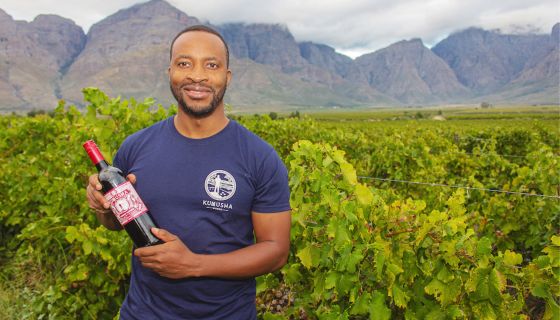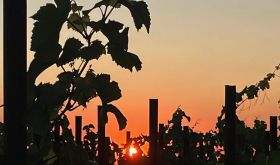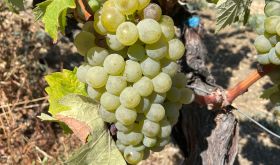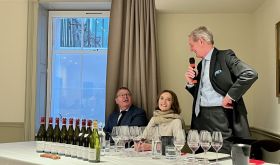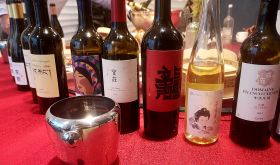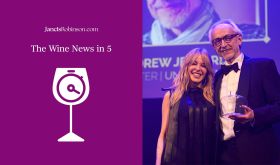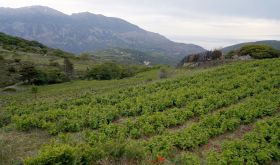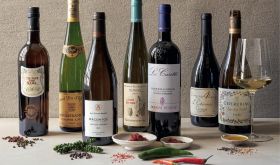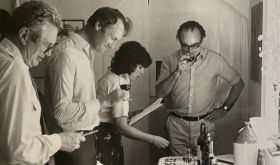Towards the end of the first decade of this century, there was an exodus of economic migrants from Zimbabwe, where, in August 2008, inflation reached a staggering 11.2 million per cent. Under President Robert Mugabe, Zimbabweans were well educated but often unable to feed themselves and their families. Many young men smuggled themselves over the border to reach South Africa with nothing but the clothes on their back.
Four of them, quite coincidentally, ended up as the respected sommeliers at Cape Town’s top four restaurants, never having known wine or fine dining in Zimbabwe – or indeed each other. After journalist Erica Platter profiled them on JancisRobinson.com in April 2016, a crowdfunding initiative was launched to get them, as Team Zimbabwe, to Burgundy to compete in the World Wine Tasting Championships – a journey documented in the award-winning film Blind Ambition.
Today, you can hear more about this extraordinary story directly from Tinashe Nyamudoka, one of the four Zim somms and now producer of Kumusha Wines, in conversation with me on The JancisRobinson.com Podcast. Subscribe now on Spotify, Apple, Stitcher, Google Podcasts, or wherever else you listen to your podcasts.
Transcript of Episode 2 – Jancis Robinson and Tinashe Nyamudoka
TINASHE NYAMUDOKA: My name is Tinashe Nyamudoka, and I’m founder and owner of Kumusha Wines.
JANCIS ROBINSON: Tell us, Tinashe, about your early life.
TINASHE NYAMUDOKA: My parents split up when I was very young, probably three years. And I ended up on my father’s side, and for the early years, were quite stressful because my father hadn’t remarried. So I was living with my aunt, and he was working. So they sent me to boarding school, which wasn't really, really fun. So I think around the age of five, six, I moved in with my aunt, and we stayed with my dad, growing up in Avondale, and it was a middle-aged family I think. We grew up in the Zim, which was still a bit fine in the nineties. I grew up in the nineties, being born in ‘85 and going to primary school as a day scholar. But what I remember vividly was going to the rural home with my father every holiday. He would send me, maybe sometimes by bus alone, to my grandfather and grandmother in the village, and I’d spend most of my holidays there.
So I spent a lot of time with my grandmother and my grandfather. My grandfather would tend the fields, grandma, the gardens. And that's the sort of life I remember, having fun in the mountains and sometimes herding cattle and playing with the kids, swimming in the river. And I sort of did my primary school up to grade seven in Avondale. Then I did high school in a boarding school closer to my rural home where my father learned, and there, I spent four years. After that, did my A levels at another school, which was closer to Harare. And yeah, I finished my A levels in 2003. My dad had passed on in 2002, and life really kind of changed, that, because my aunts had moved on to the United States. My other aunt had moved on to the US. I wasn’t staying with my mom. So it was a really sketchy period and touchy period in my life because I didn’t have someone older to really direct me.
And I made a decision not to go to university mostly because there wasn't anyone financing my tuition. And as a young boy at that time, you kind of have the freedom. So school wasn’t in my sights. So I went on to work at the supermarket. I just walked in and said, ‘I’m looking for a job’. I started working in the supermarket. They employed me packing the shelves and packing behind the tills until the manager kind of looked in my grades. So I can't say I was an A-plus student. I was pretty much a good student, got a few As. So I’d really done well in my secondary in A level, and he said, ‘You know what? I think you’re really wasting your time here. I'm going to put you in this program, which is a junior management program’.
So this company was part of the Meikles... It’s the TM supermarkets, which is equivalent to Pick n Pay in South Africa. And I think I joined there when I was around 19, 18. So they put me in that first program, managing sections, working in the bakery, working in the whole department store. And it was fun. I was still young, earning a bit of money, but still while progressing in that environment. And this is running up to around 2005 and worked until 2008. That's where life took a turn.
JANCIS ROBINSON: And what happened then?
TINASHE NYAMUDOKA: I think it’s the toughest year in Zimbabwean history, especially with economics, the politics, and the supermarkets. I was working in the supermarkets. Everything just dried up. Jancis, literally you couldn't find a bar of soap on the shelves. There was a point where you’d go to work, but your monthly pay wasn’t even enough for a day’s trip to go to it, but for some reason, you'd find people who went to work every day.
JANCIS ROBINSON: And there was rampant inflation wasn’t there?
TINASHE NYAMUDOKA: It was crazy. It was going crazy. But the fortunate part about me working in the supermarket because you’d get all those daily cooking oil, sugar that would come to the... Maybe sparingly, so that's how we survived. You’d get firsthand information that the deliverers are coming. You’d tell all your friends and families, you kind of hold a bit and sell on the black market. That's how we sort of survived. But for me, it wasn’t really what I wanted. So I had a friend who was staying in Cape Town, and they said, ‘Ash, you can come over to Cape Town. We’ll figure it out’. And I’d never left the country. I just packed my clothes and just decided I’m going to Cape Town. I had a few savings. Fortunately, I had a passport. So I took the long journey by bus from Harare, got into Johannesburg, frightened as hell because when you're Zim and they tell you Johannesburg is dangerous, and you see all this crime and all the statistics. I was very scared when I got into Jo’burg, I didn’t even leave the station.
Then took another bus overnight to Cape Town. And my friend actually was waiting for me, but you'd hear stories later on of how other peoples who just disappear. And people ended up on the streets having nowhere to go. They’ve traveled all that far. They don’t even have money left. Yeah. Then I settled into Cape Town, but it was almost of a culture shock in a way. Things seem to run very, very well in Cape Town. So I had just come on a visitor’s visa. So when my money started to run dry, I’m looking for a job now. And obviously, the first place I looked for is in a supermarket there.
I vividly remember I was staying at a hostel. It was four of us in the room. There was two guys, Congolese guys, working in a bakery. I said, ‘You know what? I’m going to a local SPAR. I’m going to look for a job. This is what I was doing in Zimbabwe. I've got my certificates’. And they laughed. And they told me there’s no way you’re going to be a Black manager in a supermarket in South Africa. So I didn't understand why until I got there, and you could tell these guys were right. I had the interview; there was a Portuguese guy running that SPAR. He said, ‘No, it’s impressive CV, but unfortunately the position you want, I can’t give you. But I’m willing to offer you a baker’s position’. And because of desperation, that time, I didn’t have any money, I just said, ‘You know what? I'll start from here.’ And it was the coldest winter to date in Cape Town, 2008. And I would wake up 4 AM, would be at the bakery, baking bread, making sure that you’ve got your bread out by 7 PM when the store opens.
And it was a tough time in that you get the reality that you’ve got no choice. You just have to start all over again. And for some reason I kind of took it upon myself. I worked there for three months, and it was fun because these Congolese guys knew how to bake bread, but their English was very poor. So the whole idea was they teach me to bake bread, I teach them English, and it was fun. It was fun, but I soon realized the money wasn’t so great. I think I was getting paid eight rand an hour by then. And my friend who I was staying with was working in restaurants, and he would come back home with these tips. And I’m calculating his daily tip is even more than enough than my weekly wage. So I said, ‘You know what? I’m in the wrong place. I need to get into restaurants’.
And the challenge was, I’d never worked in a restaurant before. Restaurant culture was so foreign to us in Zim. I never grew up going to restaurants other than fast food. So this really, culture of restaurants wasn’t in me. So we kind of devised working on a... What do you call it? A resumé. So we kind of tailored it. And my friend said, ‘Okay, just put me on there as a reference. Say you’ve been working at this and this and this.’ And I would walk the waterfront. I would walk Camps Bay just dropping CVs day by day and get called for interviews. Now that was the funny part because I walk up there, they're asking questions, ‘Oh, you’ve worked at so and so. Oh, that’s great. So tell us, what, five chardonnays from Stellenbosch...’ Now I’m stuck.
And, ‘Oh, you’ve been selling foie gras. What’s foie gras?’ Now I’m stuck. So all the time, I just didn’t get it. But what I used to do, now, after finishing the bakery shift around 12, in my area there was this five- rand internet stall for thirty minutes. And I remember then there was this site called Gumtree where you would put CVs and look for employment. And there, I actually put a CV that I’m working in a bakery. And one day the Roundhouse Restaurant rings me up, ‘Oh, come in. We’re doing group interviews. Come on this day’. I got there on that day. I think there were about fifty or sixty interviewees on that day. And we're used to... We are coming into groups of ten as group interviews. And I’m sitting there, and everyone is sort of experienced, talking about their experience, and I’m like, ‘Okay, I’m in the wrong place’.
And he comes to me, now, and fortunately enough... So I was worried because even on that Gumtree, I’d put another tailored CV. So I wasn’t sure which one he had picked. They said, ‘Oh, Tinashe, you’re working at a bakery? You're baking bread at SPAR’. I was like, ‘Yeah’. But I just jumped on from them. I said, ‘I applied, and you guys called me. I don’t have any restaurant experience. I literally know there’s white wine and red wine. The rest, I don’t know. But if you guys are looking for someone competent, someone eager to learn and someone you can teach, I’m your guy’. And I got the job. But later on, I realize they were actually looking for people without prior experience because they had this program they called Let’s Sell Lobster.
JANCIS ROBINSON: Let’s Sell Lobster.
TINASHE NYAMUDOKA: Yeah, which was hiring people without previous experience. So we were the first intake so more of guinea pigs. So I was just probably at the right time at the right place.
JANCIS ROBINSON: And you must have worked hard and impressed your bosses because it wasn’t too long after that, was it, that you were taken on by the One&Only, the very smart restaurant there?
TINASHE NYAMUDOKA: Yes. So what got me interested into wine was I had never worked in a restaurant, and I didn't start on the floor. I started polishing cutlery, and I was very frightened going into the dining room because I would literally just go drop food, run back into the kitchen, and be comfortable polishing glasses and plates. But it used to amaze me how I went into the dining room, I'm seeing people enjoying drinking wine. And when we are talking about wine, when they’re teaching us about wine, all the history and what was very peculiar was... So they taught us wine, resembling it to animals like the big five.
So they would say, ‘Okay, cabernet sauvignon is like an elephant. Elephant is the king of the jungle, big, thick skin, elegant walk, small structured’. I was like, ‘Okay, I know the big five, so this must be easy to learn’. And they picked that up, that I was really intelligent. I could articulate very well, and I was very eager to learn. So they put me on the floor, and I just got consumed with this. And I figured out if I learned wine, I would get an opportunity to be a waiter and make more money. So that was the initial... It wasn't for enjoyment at all. It was just purely to make more money.
JANCIS ROBINSON: When did you start to enjoy wine?
TINASHE NYAMUDOKA: I think when I moved to the One&Only, that’s where I saw the whole profession of sommelier because there was a group sommelier. There was sommeliers in Andre and Eric. There was wine butlers and we were starting as the wine waiters. And I realized that there’s a real career progression. I could make a career out of wine. And by that time, I’d enjoyed a glass of wine for the first time in the Roundhouse. And I was drinking wine at home, even going on my off days, going into a supermarket and just pick up a bottle and go share with friends back at our hostel. And most of those guys were drinking beer, but I was just drinking wine and just fell in love with it then.
JANCIS ROBINSON: And it was only four years, I think, after you joined the One&Only that you were representing them in a wine competition, wasn’t it?
TINASHE NYAMUDOKA: Yes.
JANCIS ROBINSON: And doing really well.
TINASHE NYAMUDOKA: Yeah. So I got there, Andrew Baker really took me under his wings and taught me quite a while. So I spent time in a Gordon Ramsay, who I only saw twice in the year, then Reuben Riffel took over. And by that time, I enrolled in the Cape Wine Academy. I was also doing WSET courses. And it was in 2013 where the competition came about, it was the inter-hotel challenge. So the whole idea was the hotels in Cape Town had to put forward a wine steward and an upcoming chef. And we competed with one of my close friends who has been in the movie with me, Marlvin, in that first scene, yeah? And I think, you know what, when you go into a competition and we check the playing field and you feel way better than them, you’re confident.
And I just nailed that competition in... Especially when it was announced that I was the winner, the whole room stood to applause. And it was a very, very proud moment for me and probably it was the start of opening the doors to come because that’s when the Oyster Box came knocking after a bit of mention in the Condé Nast magazine as one of the young people to watch in 2014.
JANCIS ROBINSON: Oyster Box was the next restaurant you worked at, was it?
TINASHE NYAMUDOKA: Yes. By the time I left One&Only, I was sommelier in Nobu, then Oyster Box had me as the head sommelier. Yeah. It was almost a peculiar move because Durban, especially the case then, is not known for wine. People were really questioning, why are you going to the Oyster Box? And for me, I think at that time, I really didn’t have direction of what I wanted to do in life. And I remember, even at the One&Only, I was struggling to go past the sommelier position. And I was still debating if wine is what I want. At that time, I was also doing a big accounting degree. I was already in my fourth year, so I was just torn between. And I think when I went to Durban, I really felt accounting is not going to be for me. I’m not that guy for spreadsheets and crunching numbers.
And I dropped out of my accounting degree with three modules to finish. And I just took on wine. And it wasn’t busy, but it gave me time to reflect. And if I go back to my journals, everything that I’m doing now, it dates back to then. I remember writing down, ‘You know what, in a few years’ time, I want to start a company, wine company’. I didn't know in what form, but I just felt... And I would go around, ask people, trying to convince them that there’s opportunity. But the good thing is I would write it in my journal, which is going back to those pages really gives me satisfaction in that what I was envisioning back then is really happening now.
JANCIS ROBINSON: But you didn’t, presumably, have in your journal, ‘I want to join a Zimbabwean wine tasting team in the World Wine Tasting Championships’.
TINASHE NYAMUDOKA: Not at all, not at all. I didn't even know there was that competition.
JANCIS ROBINSON: How did that come about?
TINASHE NYAMUDOKA: So the connection was when I was still in Nobu, at the One&Only restaurant, Luke Dale Roberts used to come with his family, and we had just made a good rapport there. So when I moved to Durban, and he was looking for a sommelier, I was the first person he called. And I said, ‘You know what? I’d love to work for the Test Kitchen’. They're number 28th best restaurant in the world. It was a no brainer.
JANCIS ROBINSON: And the best in Africa, wasn’t it, for five years running? I mean, I went there. It was a wonderful, really special place. And it’s amazing that you became head sommelier there, didn’t you?
TINASHE NYAMUDOKA: Yeah, yeah. And it came even though it was a tough financial decision because I'm coming from the big hotel, which has the financial muscle. But looking back, it’s one of those moments where you said... You’re not thinking about financial, but you’re thinking about what you get from there. And I joined 2015, and by that time I had met Joseph. He was still in Riebeek-Kasteel, but he had joined La Colombe a year earlier before me.
JANCIS ROBINSON: So Joseph was another Zimbabwean refugee who became a top sommelier, right?
TINASHE NYAMUDOKA: Yes, yes. Yes. So he was working at La Colombe, and then he enters into the South African Tasting Championship, and he makes it and we are, ‘Oh wow. This guy is traveling to France and oh’. And all of us took interest and wanted to enter the competition. 2016, I didn't enter. I think I was away in Zimbabwe when the competition happened, but 2017, I did enter, so did a whole host of Zimbabweans. And what was interesting about that year was in the top 10, you had three Zimbabweans, and in the top 15, you actually had 14. And we always were fighting for just that one position to be the outsider of the Team South Africa. And that's where John Vincent Ridon, who is the conveyor of the competition said, ‘Guys, you’ve got enough talent for you guys to make a team. If you can get funding, I will sort out the paperwork, and you guys can get training’.
And that's the formation of Team Zimbabwe and Erica had written an article, which she posted on your site. And for some reason, I think you got in touch with her, asking Erica that, ‘This article has popped up on my site. What happened to these guys?’ And she says, ‘Oh, actually, you know what, they're forming a Team Zimbabwe. They want to go to France, but they’re looking for funding. Maybe you can do something to help.’ And you set up a crowdfunding for us. And the response was just so overwhelming, you remember. Me and the rest of the guys would be on our phone looking at the donations coming in, and it’s just creeping, creeping, creeping, creeping. I think we raised almost £8,200 in a month.
JANCIS ROBINSON: Raised more than you needed, more than the target, yeah.
TINASHE NYAMUDOKA: More than the target. And it was just amazing how the power of just being in restaurants... Most of the people, it’s either they had met us in restaurants, and we'd had lovely dining experiences. They're all over the world. And that just appreciation for me was a sign of how powerful wine can be.
JANCIS ROBINSON: You four, who represented Zimbabwe in the World Wine Tasting Championships, you'd never tasted wine in Zimbabwe had you?
TINASHE NYAMUDOKA: No, no, definitely not. I knew there was wine, but I'd never tasted. Yeah, never drank it.
JANCIS ROBINSON: And all of you had started off as economic refugees in South Africa with very, very low-paid, poor-status jobs really, hadn’t you? Why do you think it is that the four of you just had this wine talent?
TINASHE NYAMUDOKA: Once you’re an immigrant, you have to really punch above the waters to really survive abroad. And it goes everywhere, not immigrants as in South Africa. But I think as an immigrant, first of all, you have to really work hard. And what you’re doing exactly is really spotting opportunities where you can really make a living. And it so happened that the hospitality was so welcoming to us in South Africa in terms of easy access to jobs. I stand to be corrected, but when we got into the industry... Now it’s full of, majority Blacks working there. But I remember when I started in the industry, it was all full of white students just getting money elsewhere. And we were there, and we did well as Zimbabweans in restaurant because we didn’t have another off day. We didn’t work three days. We worked the whole, full week, even taking double shifts.
In that, as a nature, where we always curious, and we always learning... Where we found there were opportunities, we kind of took it and left whatever we were doing before. And just said, ‘Maybe we can make a living out of this because this is what we can possibly do. With our status, there's nothing else’. And I think for me, that’s what ended in it. Why are we good tasters? Maybe it's the schooling we got, or maybe it’s just good memory. I think it was part of the question that Erica Platter posed when you were saying, ‘Why all of a sudden there’s top sommeliers in top restaurants in South Africa?’ But I think it’s got to do with a bit of the education we got, which we are grateful, and articulation and just the desire to be where you are and do the best you can in those circumstances.
JANCIS ROBINSON: What was your reaction when you heard that some people were going to make a film about you at the World Wine Tasting Championships?
TINASHE NYAMUDOKA: Yeah. First of all, we didn't believe it. It was like, ‘Okay, we’re just four guys. We’ve got a story to tell, but is it big enough to be movie star?’ But for some reason... Erica Platter said it, ‘Guys, you guys are going to make a film one day’. And it so happened. So it took a while for us to really think it was going to be serious. But for me, I’d watched Red Obsession looking for any wine material I could get, any line. So I came across Red Obsession, and when I saw it was the same directors doing this, then I said, ‘Okay, guys, this is really serious’. And we had a phone call with Warwick Ross and Rob Coe, the directors, and sooner than later, they were in Cape Town with the whole camera crew. And we said, ‘Okay, this is now serious’. Yeah.
JANCIS ROBINSON: And were you pleased with the film? Do you think they got the tone right?
TINASHE NYAMUDOKA: I, for one, was pleased. Obviously, it’s the first time in my life I had to share that in-depth about my life and really open up, and it takes a lot. But I think that the two directors were very good at getting words out of your mouth and really getting to the marrow, not just the bone. So you know what, I’m happy that the story has to be shared, not that I want any fame or to be famous or so. But I just feel I had the obligation for my story to be told in order to touch someone else or inspire someone else. So I’m really happy with how the film came about and hopefully it goes to show everywhere and touch a lot of lives.
JANCIS ROBINSON: It’s done very well. And it’s been very moving, I think, for a lot of people. And it’s done a lot of good for the reputation of refugees and immigrants, generally, I think.
TINASHE NYAMUDOKA: Exactly.
JANCIS ROBINSON: Yeah. And I’m so glad they went and filmed in Zimbabwe, itself. And those lovely scenes of you and your grandfather – they’re very, very touching.
TINASHE NYAMUDOKA: Yeah. It is probably one of the most touching scene because he died, when, last year, never got to watch the film. But every time I went back, he'd be like, ‘Ah, oh, wait, you came with those... Tinashe came with the murungu filming and...’
JANCIS ROBINSON: What’s a murungu?
TINASHE NYAMUDOKA: Murungu is a white. Murungu. So, we call him murungu which is a white person in a sense. And the guys set up a drone, and it was making those sound. And even up to now, people say, ‘Do you know? Tinashe brought those people who brought that thing, which was flying in the air. Maybe they were here to bomb us’. So no, it is amazing, man. And I always go climb that mountain whenever I’m in Zimbabwe. It just gives me a sense of place and a healing.
JANCIS ROBINSON: You want to make wine there, don’t you?
TINASHE NYAMUDOKA: Yeah, busy exploring already. So it’s in the pipeline. It’s not a dream already. So hopefully in the next few years I’ll be pressing wine from my grandfather’s homestead.
JANCIS ROBINSON: But that you haven’t remained on the restaurant floor, have you? You've achieved another of your ambitions.
TINASHE NYAMUDOKA: Yeah. So I left in 2020, just before COVID, and I really wanted to explore the wine industry and especially for me. So when I realized that when I was studying wine, I enjoy more of the economics and business side of wine. But in nature, especially in South Africa at the moment, I think all wine studies are more to do with viticulture, viniculture, and being a sommelier. And that really impacted me a lot because not all of us want to understand the chemistry, and the stainless steel, oaking and stuff. I enjoy the selling, the communication of wine, and there wasn’t such space for me. And when I looked at the guys before me who were sommeliers, they sort of did the sommelier but after that, nothing ever happened. And I always say the sommelier profession is not much more different from being a sports star. You’re going to hit your prime years where you’ve got the attention and the knowledge. But with time, it has to be evolving where new blood has to come in.
And I felt, for my brothers, especially Black brothers who came before me, when they hit that ceiling, they didn’t have anywhere to go. And now they’ll go back to old jobs, that as being waiters. But when I thought the white counterparts who were sommeliers, they went on to progress, to open distribution businesses, starting wine businesses. So I think with Kumusha, obviously, it became a business, but it's still a mission for me where I wanted to open up the space especially for the people coming through.
And I get that every day in the inbox, someone saying, ‘Okay, we want to bottle our own wine. How do we do that?’ And I keep on telling them not everyone is going to bottle wine. The wine value chain is so vast. You might be good in wine writing. You might be good in retail. You might be good in distribution, but there wasn’t a blueprint for that. There wasn’t an example. So for me, I think the most driving force was that. Of course, now I’m more into production, but with that, I’m learning a lot about distribution. I’m learning a lot about export. Now I’m in Minnesota. I’m in America, on the road, selling and distribution. And for me, it’s what we want. I think the young Blacks want those sort of tangible examples of someone really being a success. And that’s why I’m bent on making this Kumusha product, Kumusha Wines into a success, so people can learn from it.
JANCIS ROBINSON: Did you encounter much prejudice on your way up? I mean, you’re sort of top of the tree now, but in the South African wine society?
TINASHE NYAMUDOKA: Yeah. It was. It was a lot. There’s always self-doubt and people questioning because I’m not a fully-fledged wine maker. I’m now encroaching into wine making, so that traditional guys will be like, ‘Okay, what is this guy doing, pretending to be a wine maker, not making wine?’ You don’t want to take notice of it. But sometimes, because you’re a wine professional... I mean, wine is about integrity. And that’s why I have set on saying wherever I go, ‘I’m not a fully-fledged wine maker. I’m not pretending to be one, but I want a space in the wine industry.’ And wine is not all about the wine making, even wine in the bottle. Wine making is just a small percentage, but the good wines are blended in the cellar.
And so it was always fighting against that. But interesting enough, now they stop to ask, ‘Oh, why is this guy doing it?’ Now they are asking how am I doing it? Because it's just getting bigger and bigger. The form of the prejudice now is much more institutionalized. I can’t really prove it. How can I prove that? I’m trying to get into retail? I can’t get into retail, and all the decision-making people in the retail are all white. So, if I can’t get in, they told me my brand is not good enough, what other reason can I attach it to? But I can't really say it’s that. So it is kind of institutionalized, that. For me, what's important is to create our own spaces as Blacks and then integrate from there.
JANCIS ROBINSON: Well, your wines have been accepted abroad, haven’t they? I mean, I’ve tasted some of them. I’m really impressed, as I think... I’ve written some enthusiastic tasting notes on them. And how long are you spending in the US?
TINASHE NYAMUDOKA: I’m here for two months. So I’ve come in Minnesota. I’ve probably gone through ten states. And yeah, it’s my first time in the US, and I’m really taking it in. And it’s a very challenging market, but it has been accepting of my wine. Yeah. I’m really grateful.
JANCIS ROBINSON: Kumusha is the brand. What does it mean?
TINASHE NYAMUDOKA: So Kumusha is a Shona word. It means your roots, your origin, your home. And for me, when I was studying wine, the most difficult part was associating fruits and flavors. Even up to now, I’ve never seen a black currant tree, but I’m supposed to pick up this flavor. So they didn’t really come natural to me. And I used to go to the supermarket fruit and veg section just to familiarize myself with the fruits. But what was so really changing in my own appreciation was when I started to associate fruits and flavors in my wine with what I grew up eating back in Zimbabwe.
It so made sense to me that... At that time, I was reading the book Liquid Memory by Jonathan Nossiter. So there is a part where he says, ‘We always say wine of origin is where the wines is being made and the history of that place. But what if you’ve never been there? What about wine of origin can be where the wine is taking you?’ And it really resonated with me because when I was smelling a glass, it was taking me back home first, then I’d say, ‘Okay’. So in my school, in my tasting exams, I had made a whole parallel vocabulary. So I had notes of the Zimbabwean fruits I grew up tasting.
For instance, I would say, if I smell hute, which is a water berry. You find it mostly along the rivers in Zimbabwe. I used to associate it with the pinot noir. So if I smell the water berry, I’ll say, ‘Okay, this is a pinot noir.’ Okay. What do they say the pinot noir in New York Times? Okay, mulberry, whatever, cherry. You’d find out, most of my tasting exams are distinctions, and that’s the same thing we used at the Blind Tasting Championship with my Zimbabwean brothers because we're associating fruits and flavors we grew up eating. And it made wine much more enjoyable because I’m not picking up a glass, trying to find what’s in there. Now what’s in the glass is finding me.
JANCIS ROBINSON: Do you still use any of the big five animals in your tasting notes?
TINASHE NYAMUDOKA: Yeah, I still do, especially when I’m teaching. When I go, especially in Africa, and I’m doing these tastings where my wines are. And I always bring that up because it really stuck with me, and it resonates with most of the guys. So I still use it quite a lot, yeah. It was quite funny.
JANCIS ROBINSON: Yes. Well, it does seem funny to me, but it probably seems funny to a lot of people that people in England say, ‘Oh, black currants, gooseberries, blah, blah, blah’. Do you teach wine then?
TINASHE NYAMUDOKA: I think much more of my teaching is just on the job especially when I’m at work. So now I consult to restaurants, even for my former boss. And my teaching has always been trying to get the people to taste in a more natural way, not looking for these exotic fruits. My teaching is all about understanding the wine structure, how the wine is making you feel. Do you enjoy it? Okay. Why do you like it more than these bourgeoisie terms. And I’ve been trying to do some level two WSET. Cathy Marston, who runs it here, has allowed me to attend some of the lectures. But I don’t think teaching really comes natural to me, the classroom teaching. I am a teacher by what I do, where I go, and what I say.
JANCIS ROBINSON: I think you’re right. I think you are. The film’s called Blind Ambition. Do you have an ambition?
TINASHE NYAMUDOKA: Yeah, lots of ambitions. I think one of the biggest ambition is to be worldly regarded and respected like a Jancis Robinson MW.
JANCIS ROBINSON: Oh, go on.
TINASHE NYAMUDOKA: But yeah, I think one of my ambitions, when I’m really settled, I would really love to tackle the MW...
JANCIS ROBINSON: The Master of Wine exam.
TINASHE NYAMUDOKA: The Master of Wine, yeah, just on a personal level and see where I can... And this is amongst us peers and as a profession, just like someone who then trains to want to have a PhD. I think that’s one of my ambitions. And the second of all is to really create a legacy business. I want to be one of those Yellow Tail wines, Bigfoot wines of the world, Concha y Toros of the world, and really change a lot of lives and open real meaningful change. And I don’t aspire to be a rich person. I don’t aspire to make a lot of money. But I feel the next chapter and level of what I want to do, money is the means to get there. So the more successful the brand becomes, the more I can channel back and improve other people who aspire to be like me.
JANCIS ROBINSON: Lovely. Thank you very, very much, Tinashe, and wish you the very best of luck on your two-month sales tour.
TINASHE NYAMUDOKA: Awesome. Thank you so much for helping me.

